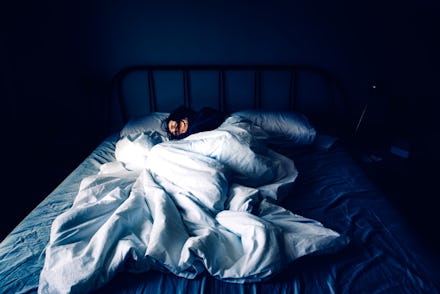How to deal with sleep paralysis, a condition as scary as it sounds

The last time it happened was a Saturday morning about two weeks ago. My eyes fluttered open — but when I tried to sit up, I couldn’t. I spiraled into panic mode. Although I could see my sunlit bedroom and my partner asleep beside me, I was utterly immobilized. Only with immense effort did I finally wriggle my torso and break my frozen state. I’ve experienced this phenomenon, known as sleep paralysis, since I was a kid, yet it never fails to freak me out. After finding myself in this terrifying situation every now and then for most of my life, I asked an expert to help me understand what exactly sleep paralysis is, and how to prevent it.
Sleep paralysis occurs when your mind is awake, but your body can’t move, Xue Ming, a sleep expert and professor of neurology at the Rutgers New Jersey Medical School, tells me. You can experience it as you awaken, or as you fall asleep, per the National Sleep Foundation. You might even hallucinate. It can be extremely anxiety-inducing, Ming says, and can happen to anyone.
When I told a friend about my sleep paralysis back in high school, she said her relatives, who are Chinese, attribute it to a ghost sitting on your chest. (Great, I thought.) Other cultures also trace it to apparitions and evil spirits. But Ming offers another, less supernatural, explanation.
You go through four stages of sleep multiple times a night, according to Michigan Medicine: two stages of light sleep, one stage of deep sleep, and rapid eye movement, or REM, sleep. You can dream during the first three sleep stages, or non-REM sleep, Ming says. But REM is when you have those vivid, fantastical dreams — about soaring over the Empire State Building, for instance, or communing with dolphins.
When your brain switches from non-REM to REM sleep, all your muscles — except for your eyes and your diaphragm, which allows you to breathe — become paralyzed, and for good reason, Ming says. Otherwise, you’ll act out your dreams, a condition known as REM sleep behavior disorder, which can be dangerous. Ming tells me about someone with the disorder who dreamed they were a bird and tried to fly off their bed.
Likewise, when your brain switches from REM sleep to wakefulness, so does your body, allowing you to move your muscles again, Ming says. Sleep paralysis happens when your brain switches from REM sleep to wakefulness, but your body stays in REM — that is, your muscles remain paralyzed. Basically, your brain and body aren’t on the same page.
Like me, you might even hallucinate. (During one sleep paralysis episode, I saw a ghostly woman in a white gown standing at the foot of my bed.) This can happen at the tail end of REM sleep — again, when you do most of your vivid dreaming — before you’ve fully transitioned into wakefulness, according to the National Sleep Foundation.
So how do you deal when you’re in the grip of sleep paralysis? Easier said than done, but “try not to panic,” Ming says. Since your senses are still intact, keep your ears peeled for any sounds in your surroundings. “Once you hear the noise, it will wake your brain out of REM sleep.” The same goes if someone nudges you, but listening for a sound is a bit more under your control. I also find it helpful to remind myself that I’ve experienced this before, and that I’ll snap out of it soon.
Ming adds that you tend to experience sleep paralysis when you’ve been sleep-deprived, which has definitely been my experience. When you finally do get to clock in some sleep, you spend more time than usual in REM sleep. This throws off your brain and body; they aren’t used to switching between such prolonged REM sleep, and wakefulness. To help prevent sleep paralysis, then, make sure you’re getting enough sleep each night, or at least seven hours for adults ages 18 to 60, as recommended by the Centers for Disease Control and Prevention.
Sleep paralysis is still scary, but understanding it as the REM sleep/wakefulness switches in my brain and body falling out of sync makes it slightly less so. It’s certainly more reassuring than a ghost haunting me.